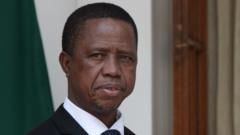A significant policy review in South Africa could facilitate Elon Musk's Starlink service to launch in the country, bypassing the controversial local ownership laws aimed at addressing historical economic inequities.
**Starlink's Path to South African Approval: A Regulatory Shift Ahead**

**Starlink's Path to South African Approval: A Regulatory Shift Ahead**
The South African government is reviewing policies that may enable Elon Musk's satellite service, Starlink, to enter the market without meeting local ownership requirements.
In a recent development, the South African government has initiated a policy review that opens up the possibility for Elon Musk’s satellite internet service, Starlink, to operate in the country. This move could mean that Musk will not have to comply with local laws requiring foreign companies to grant partial ownership to Black South Africans, a policy rooted in efforts to rectify economic disparities stemming from the apartheid era.
The current regulations mandate that foreign firms, to foster inclusivity and address ongoing economic inequalities, must provide a share of ownership to historically disadvantaged groups. These laws are designed to redress the exclusion of many South Africans from business opportunities during the apartheid period, a legacy that still casts a long shadow over the nation's economic landscape. However, Musk has criticized these ownership stipulations as discriminatory, expressing on his social media platform that “Starlink is not allowed to operate in South Africa, because I’m not black.”
The timing of the South African government's announcement is notable, coming just days after a tense meeting at the White House. President Trump confronted South African President Cyril Ramaphosa over disputed claims concerning violence against white farmers, hinting at the complexities of their bilateral relations. U.S. officials have suggested that easing ownership requirements for American companies like Starlink could be a step towards improving trade relations between the two nations. This thorough assessment of the policy could represent a strategic maneuver by President Ramaphosa to cultivate better ties with the United States.
With this policy review, South Africa stands on the brink of a potential shift in its approach to foreign investment, particularly in high-tech sectors like satellite internet. If successful, this could not only allow Starlink to expand its global footprint but also symbolize a significant change in how the country balances historical legacies against the need for modern technological advancements. The implications of these shifts will resonate beyond South Africa, influencing similar policies in other emerging markets facing the challenge of reconciling equity with economic growth.
The current regulations mandate that foreign firms, to foster inclusivity and address ongoing economic inequalities, must provide a share of ownership to historically disadvantaged groups. These laws are designed to redress the exclusion of many South Africans from business opportunities during the apartheid period, a legacy that still casts a long shadow over the nation's economic landscape. However, Musk has criticized these ownership stipulations as discriminatory, expressing on his social media platform that “Starlink is not allowed to operate in South Africa, because I’m not black.”
The timing of the South African government's announcement is notable, coming just days after a tense meeting at the White House. President Trump confronted South African President Cyril Ramaphosa over disputed claims concerning violence against white farmers, hinting at the complexities of their bilateral relations. U.S. officials have suggested that easing ownership requirements for American companies like Starlink could be a step towards improving trade relations between the two nations. This thorough assessment of the policy could represent a strategic maneuver by President Ramaphosa to cultivate better ties with the United States.
With this policy review, South Africa stands on the brink of a potential shift in its approach to foreign investment, particularly in high-tech sectors like satellite internet. If successful, this could not only allow Starlink to expand its global footprint but also symbolize a significant change in how the country balances historical legacies against the need for modern technological advancements. The implications of these shifts will resonate beyond South Africa, influencing similar policies in other emerging markets facing the challenge of reconciling equity with economic growth.






















